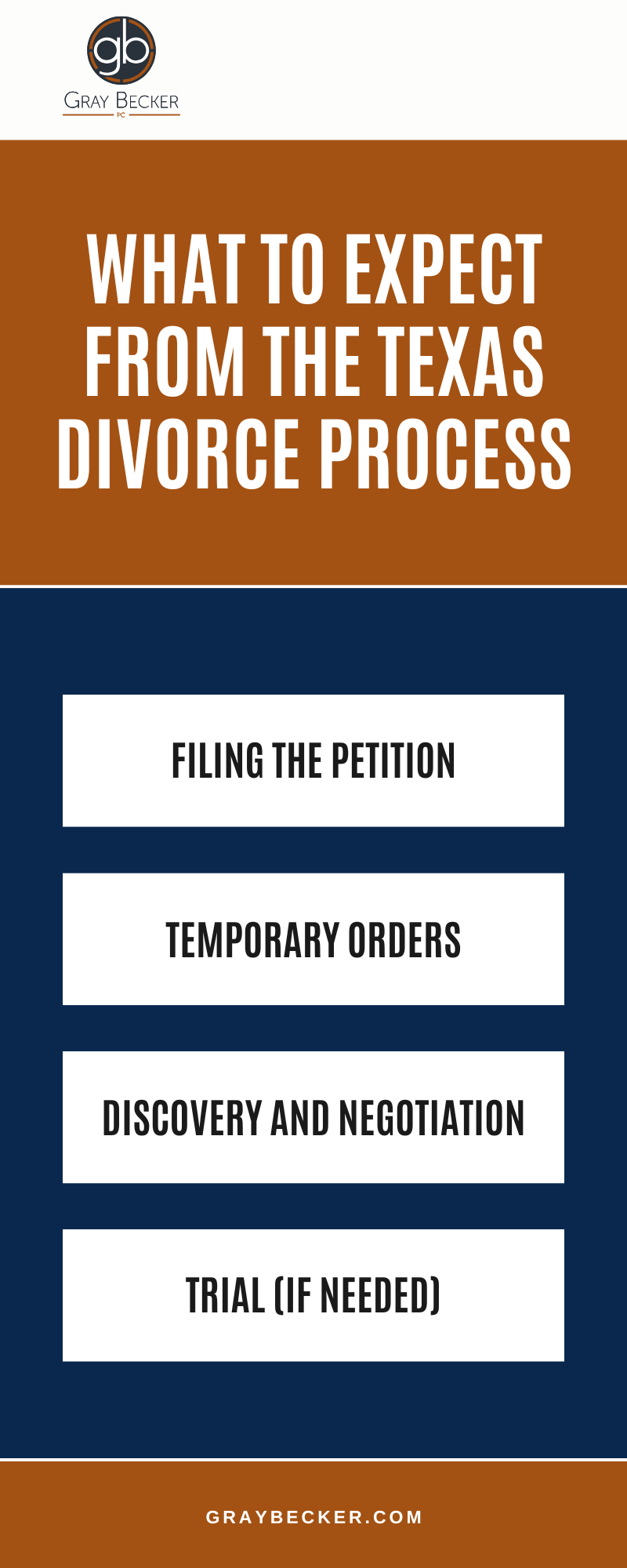Austin Divorce Lawyers: Compassionate, Strategic Legal Support You Can Trust
Divorce is never easy. Whether your separation is amicable or filled with conflict, it’s a deeply personal and often emotionally charged process. At Gray Becker, P.C., we understand how high the stakes are—for your children, your finances, and your future. With more than 100 years of combined legal experience, our Austin-based attorneys provide personalized, effective, and compassionate representation for individuals navigating divorce in Texas.
This guide is here to support you with real answers—not just legal jargon or surface-level tips. You’ll learn about Texas divorce laws, common challenges, and how our team can help protect your rights through every stage of the process.
Understanding Divorce in Texas
No-Fault vs. Fault-Based Divorce
Texas allows for both “no-fault” and “fault-based” divorces. Most people choose no-fault divorce, citing “insupportability”—meaning the marriage can no longer continue due to conflict or personality differences. However, if your spouse committed adultery, was abusive, or abandoned the relationship, a fault-based divorce may give you leverage in court when dividing property or negotiating custody.
Residency Requirements
To file for divorce in Texas:
- One spouse must have lived in Texas for at least six months, and
- In the county where you file for at least 90 days.
Once filed, there’s a mandatory 60-day waiting period before your divorce can be finalized—unless there’s a protective order due to family violence.
What to Expect from the Texas Divorce Process
Every divorce has its own pace and path. However, the typical process includes:
1. Filing the Petition
The process starts when one spouse (the petitioner) files an Original Petition for Divorce with the court. This document includes details like the grounds for divorce, property division, and child-related requests.
2. Temporary Orders
Because divorce can take months, the court may issue temporary orders for:
- Child custody and support
- Who lives in the home
- Access to bank accounts or vehicles
- Payment of bills or debts
Temporary orders ensure that both parties and children are protected while the case is pending.
3. Discovery and Negotiation
This phase involves gathering information about income, assets, debts, and property, along with anything relevant to child custody or fault allegations. Many divorces are resolved at this stage through mediation or settlement negotiations.
4. Trial (If Needed)
If you and your spouse can’t reach an agreement, your case will go to trial. A judge will make decisions on property division, spousal support, child custody, and more. At Gray Becker, P.C., we prepare every case as though it may go to trial—so you’re never caught off guard.

Dividing Property: Community vs. Separate Assets
Texas is a community property state, which means that most property acquired during the marriage is jointly owned and subject to division.
Community Property Includes:
- Wages earned by either spouse
- Homes, vehicles, and real estate purchased during the marriage
- Retirement accounts and pensions
- Debts incurred during the marriage
Separate Property Includes:
- Property owned before the marriage
- Gifts or inheritances received individually
- Personal injury settlements (except lost wages or medical bills)
If there’s a dispute about whether something is community or separate, the court will review records to determine how and when it was acquired.
High-Asset Divorce
In high-net-worth divorces, the stakes are even greater. Business ownership, investments, stock options, trusts, and luxury property all require accurate valuation and careful division. We work with forensic accountants, appraisers, and tax professionals to ensure our clients receive a fair share—and to trace assets if financial misconduct is suspected.
Child Custody: Protecting What Matters Most
Nothing is more important than your children. In Texas, the legal term for custody is “conservatorship.”
Types of Conservatorship
- Joint Managing Conservatorship (JMC): Both parents share rights and responsibilities.
- Sole Managing Conservatorship (SMC): One parent has primary legal authority, often due to abuse, neglect, or instability.
The Best Interest of the Child
The court considers:
- Emotional and physical needs of the child
- Each parent’s ability to care for the child
- Stability of each home
- History of violence or neglect
- Child’s preferences (if over 12 years old)
We help parents negotiate parenting plans that address school schedules, holidays, decision-making authority, and relocation limitations.
Child Support and Enforcement
Texas uses statutory guidelines to calculate support, based on the non-custodial parent’s income and the number of children.
Typical percentage guidelines:
- 1 child: 20% of net income
- 2 children: 25%
- 3 children: 30%, and so on
Support can be enforced through:
- Wage garnishment
- Liens
- License suspension
- Contempt of court charges
If your circumstances change, we can help you request a modification or challenge an unfair support amount.

Spousal Maintenance (Alimony)
Unlike some states, Texas does not automatically award alimony. You must prove eligibility.
You may qualify for spousal maintenance if:
- Your marriage lasted 10+ years and you can’t meet basic needs
- You’re caring for a child with a disability
- You have a physical or mental disability
- Your spouse was convicted of domestic violence
The amount and duration of payments depend on:
- Earning capacity
- Job skills and education
- Age and health
- Contributions to the marriage (homemaking, supporting a spouse’s education)
Why Clients Choose Gray Becker, P.C.
Our team stands out because of our commitment to excellence, strategy, and results. But beyond the credentials, we believe what truly matters is how we show up for you.
Our Strengths:
- Over 100 years of combined experience in Texas family law
- Board-Certified Family Law specialists on staff
- Award-winning lawyers recognized by Super Lawyers and Best Lawyers in America
- A client-first philosophy: clear communication, honest guidance, and timely updates
- Expertise in high-conflict and high-asset cases
- Award-winning service backed by peer and client recognition – See our full list of awards and recognitions »
We’ve guided clients through peaceful settlements, courtroom battles, and everything in between. Whether you’re seeking full custody, protecting business interests, or simply want to get through divorce with dignity, we’re here to help.
Ready to Protect What Matters Most?
Whether you’re facing a complex financial situation, navigating a custody dispute, or simply want to move forward with clarity, Gray Becker, P.C. is here to guide you with strategic insight and steady support.
Don’t wait until conflict escalates or critical decisions are made without your input. Let our experienced Austin divorce attorneys help you take control, protect your assets, and prioritize your family’s well-being.
Schedule Your Confidential Consultation Today
Take the first step toward clarity and peace of mind. Our attorneys are ready to listen, explain your options, and build a plan that fits your goals.
Call 512-482-0061 now
or
Use our contact form to schedule your private consultation.
Austin Divorce Infographic


Austin Divorce FAQs
Divorce is never easy, but being informed before you begin can reduce stress and help you make confident decisions. Whether your divorce is contested or amicable, there are legal, financial, and emotional factors that must be addressed carefully. Working with an experienced Austin, TX divorce lawyer can help you move forward with clarity, stability, and a strong legal strategy.
Below are answers to some of the most frequently asked questions we receive about filing for divorce in Austin.
What Should I Do Before Filing for Divorce in Austin?
Before filing, gather key financial documents, including bank statements, tax returns, mortgage paperwork, retirement accounts, and insurance policies. Review your assets and debts, and consider your long-term goals for property division, custody (if applicable), and support. Think about how the divorce may affect your housing, income, and parenting arrangements.
To file for divorce in Texas, at least one spouse must have lived in the state for six months and in the county where the divorce is filed for at least 90 days. Meeting with a divorce attorney early in the process can help you prepare and avoid costly mistakes.
What If My Spouse Doesn’t Agree to the Divorce?
Texas does not require both parties to agree to the divorce. If your spouse contests the divorce or refuses to cooperate, you can still proceed through the court system.
While a contested divorce may take longer and involve more hearings, your spouse cannot stop the divorce entirely. They do have the right to challenge issues like custody, support, or property division, so it’s crucial to have legal representation to protect your interests if the case becomes adversarial.
What Are the Grounds for Divorce in Texas?
Texas recognizes both no-fault and fault-based divorces.
- Most people file for no-fault divorce under the ground of “insupportability,” which means the marriage has become unworkable due to conflict or personality differences.
- Fault-based grounds include adultery, cruelty, abandonment, felony conviction, confinement in a mental hospital, and more.
While proving fault is not required to file for divorce, doing so can influence the court’s decisions on property division, spousal support, or even custody. A qualified divorce lawyer can help you evaluate which grounds are most appropriate for your case.
Do I Have to Be Separated Before Divorce in Texas?
No. Texas does not recognize legal separation, and there’s no requirement to live apart before filing.
However, Texas does impose a mandatory 60-day waiting period after the divorce petition is filed before the court can finalize the divorce. During this time, temporary orders can be issued to address custody, support, and property access while the divorce is pending.
How Is Property Divided in an Austin Divorce?
Texas is a community property state, meaning most assets and debts acquired during the marriage are considered jointly owned and subject to division.
This doesn’t always mean a 50/50 split. Courts aim for a “just and right” division, which considers:
- Each spouse’s income and earning potential
- Who is at fault in the breakup (if applicable)
- Custody arrangements
- Health, age, and future needs of each party
Separate property—such as gifts, inheritances, or assets owned before the marriage—is generally not divided, provided it can be clearly documented. An experienced Austin divorce lawyer can help you protect your rights and ensure a fair settlement.
What Happens If We Have Children?
When children are involved, the court’s primary concern is the best interest of the child. Texas uses the term “conservatorship” instead of custody, and typically favors joint managing conservatorship, meaning both parents share rights and responsibilities.
That said, specific arrangements—like who the child lives with, holiday schedules, and decision-making rights—are outlined in a parenting plan. If one parent poses a risk to the child’s wellbeing, the court may order sole managing conservatorship or supervised visitation.
Child support is also addressed, using state guidelines based on income, number of children, and expenses such as healthcare or daycare. Your attorney can help ensure that parenting plans and support arrangements are fair, realistic, and enforceable.
Can I Modify Custody or Support After the Divorce?
Yes. Texas allows modification of child custody, visitation, or support orders when there has been a material and substantial change in circumstances.
Common reasons for modification include:
- Relocation by one parent
- Significant change in income
- Medical needs of the child
- Changes in parenting time or involvement
Either parent can request a review of the order. We can help you prepare a petition and gather the right evidence to support your case for modification or to oppose one filed by your ex.
Will I Have to Go to Court for My Divorce?
Not always. Many divorces are resolved through negotiation, mediation, or collaborative law—which can help reduce stress, save money, and maintain privacy.
If you and your spouse can agree on all terms (custody, support, property, etc.), your case may qualify as an uncontested divorce, which is faster and typically does not require a trial. However, if agreement isn’t possible, the case will move forward to a final hearing or trial, where a judge makes the final decisions.
At Gray Becker, P.C., we prepare every case thoroughly so that you’re fully protected, whether your divorce is resolved peacefully or through litigation.
Can I Stay in the Marital Home During the Divorce?
Yes, but it depends on your situation. Temporary orders issued at the beginning of the divorce can determine who stays in the home, who pays the mortgage, and whether one party must move out.
Courts often try to avoid disrupting children’s lives and may allow the primary caregiver to remain in the home. However, if there is conflict, domestic violence, or financial instability, a judge may order exclusive use of the home to one spouse for safety or fairness.
How Long Does Divorce Take in Austin?
While the minimum waiting period is 60 days, most divorces in Austin take 4 to 12 months depending on complexity, whether children are involved, and how cooperative both parties are.
Contested divorces or those involving business ownership, high-value assets, custody disputes, or discovery may take longer. Your lawyer can give you a clearer estimate based on the facts of your case.
How Much Does It Cost to Get Divorced in Austin?
Divorce costs vary widely based on:
- Whether the divorce is contested or uncontested
- Attorney’s fees and court filing fees
- Mediation or expert witness costs (e.g., appraisers, forensic accountants)
- Whether the case proceeds to trial
We offer consultations to discuss your situation, potential costs, and flexible billing options when appropriate. Clear communication and goal-oriented planning help minimize surprises and control expenses.
What to Do Now
If you’re considering divorce—or are already in the middle of one—it’s time to protect your future. The earlier you consult with an attorney, the more options you’ll have and the fewer surprises you’ll face.
Schedule a Consultation Today
At Gray Becker, P.C., your initial consultation is the first step in building a smarter strategy for your life ahead. We’ll review your concerns, outline next steps, and walk you through timelines, expectations, and legal protections available to you.
Call 512-482-0061 now
or
Use our contact form to schedule your private consultation.
Property Division Lawyer Austin, TX
While some assets are easy to value and divide, others are more challenging and require more analysis. Our attorneys take a tailored approach to help clients reach desirable outcomes. Additionally, we have developed relationships with high-quality CPAs, tax advisers, appraisers, and business valuation experts to further assist our clients with this complicated matter.
Learn More About Property Division Lawyer Austin, TX in TexasHigh Asset Divorce Lawyer Austin, TX
A high-asset divorce often requires a more thorough approach with the help of outside professionals. This may include accountants, appraisers, and private investigators. Our team has extensive experience with these complex cases and relationships with professionals who can help you achieve a favorable outcome.
Learn More About High Asset Divorce Lawyer Austin, TX in Texas
